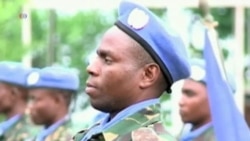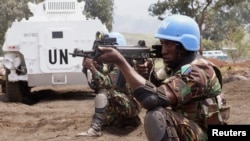UNITED NATIONS —
Last week, the Congolese army, with the help of United Nations peacekeepers, crushed a rebel group that had terrorized the eastern Democratic Republic of Congo for 20 months. Support from a specially created U.N. “intervention brigade” helped change the military dynamic and push rebels into peace talks they had resisted.
This time last year, Congo’s poorly trained and undisciplined army abandoned their positions in North Kivu province, letting rebels from the group called M23 advance and briefly seize the regional capital, Goma.
But that all changed recently when over a two-week period the newly bolstered army began retaking rebel strongholds, finally crushing the rebellion.
Columbia University international affairs professor Dirk Salomons attributes this shift to two developments.
“First of all the government put pressure on Rwanda and Uganda, who were secretly backstopping M23," he said. "Secondly, the U.N. finally rolled up its sleeves and got a competent brigade in to knock some heads together.”
The U.N. brigade he refers to are 3,000 well-armed South African, Tanzanian and Malawian peacekeepers, backed by attack helicopters and empowered by the U.N. Security Council to neutralize the dozens of armed groups that threaten civilians in eastern Congo.
The brigade started deploying in July, beefing up the 17,000 U.N. peacekeepers already there.
U.N. Secretary-General Ban Ki-moon said this week that the intervention brigade changed dynamics on the ground and enabled the U.N. mission to better protect civilians.
“It [the intervention brigade] will remain a critical tool in support of the comprehensive political process and the protection of civilians,” he said.
Salomons says the U.N. Security Council was strategically smart to choose African soldiers.
“Security Council said let’s put South African, Malawi and Tanzania into those troops. If they start fighting M23, and Rwanda and Uganda back M23, it’s going to be a regional war," he said. "So basically the warning was we put South Africans in the field, we put Malawians in the field, you don’t mess with them.”
Analysts say the military defeat of M23 could serve as a warning to other militias, as well as to the international companies who finance these groups by buying looted minerals. The military victory has also added momentum to political talks between the parties in Kampala, Uganda.
Peacekeeping expert Arthur Boutellis of the International Peace Institute in New York says the real challenge now will be to see if a sustainable solution can be achieved.
“But [it remains to be seen] whether this will actually translate into a durable political agreement, of course, between the M23 and Congolese government, but more broadly at the regional level to address the root causes of the conflict in eastern DRC," he said. "Otherwise this will have only been a temporary success.”
The experts say other armed groups will be watching to see how the government treats M23. If they are fair, they say, it could encourage some militias to make deals to lay down their weapons as well.
This time last year, Congo’s poorly trained and undisciplined army abandoned their positions in North Kivu province, letting rebels from the group called M23 advance and briefly seize the regional capital, Goma.
But that all changed recently when over a two-week period the newly bolstered army began retaking rebel strongholds, finally crushing the rebellion.
Columbia University international affairs professor Dirk Salomons attributes this shift to two developments.
“First of all the government put pressure on Rwanda and Uganda, who were secretly backstopping M23," he said. "Secondly, the U.N. finally rolled up its sleeves and got a competent brigade in to knock some heads together.”
The U.N. brigade he refers to are 3,000 well-armed South African, Tanzanian and Malawian peacekeepers, backed by attack helicopters and empowered by the U.N. Security Council to neutralize the dozens of armed groups that threaten civilians in eastern Congo.
The brigade started deploying in July, beefing up the 17,000 U.N. peacekeepers already there.
U.N. Secretary-General Ban Ki-moon said this week that the intervention brigade changed dynamics on the ground and enabled the U.N. mission to better protect civilians.
“It [the intervention brigade] will remain a critical tool in support of the comprehensive political process and the protection of civilians,” he said.
Salomons says the U.N. Security Council was strategically smart to choose African soldiers.
“Security Council said let’s put South African, Malawi and Tanzania into those troops. If they start fighting M23, and Rwanda and Uganda back M23, it’s going to be a regional war," he said. "So basically the warning was we put South Africans in the field, we put Malawians in the field, you don’t mess with them.”
Analysts say the military defeat of M23 could serve as a warning to other militias, as well as to the international companies who finance these groups by buying looted minerals. The military victory has also added momentum to political talks between the parties in Kampala, Uganda.
Peacekeeping expert Arthur Boutellis of the International Peace Institute in New York says the real challenge now will be to see if a sustainable solution can be achieved.
“But [it remains to be seen] whether this will actually translate into a durable political agreement, of course, between the M23 and Congolese government, but more broadly at the regional level to address the root causes of the conflict in eastern DRC," he said. "Otherwise this will have only been a temporary success.”
The experts say other armed groups will be watching to see how the government treats M23. If they are fair, they say, it could encourage some militias to make deals to lay down their weapons as well.






